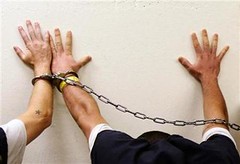
Prisoners in Orange County, California during June 2009. The Center for Constitutional Rights has filed suit claiming that the isolation of Muslim inmates should be banned.
Originally uploaded by Pan-African News Wire File Photos
Tue, Mar 30 2010
By Basil Katz
NEW YORK (Reuters) - U.S. prison units specially designed to muzzle communications by inmates considered extremist are unconstitutional and discriminate against Muslims, according to a lawsuit filed on Tuesday by the Center for Constitutional Rights.
The 77-page lawsuit filed with the U.S. District Court for the District of Columbia takes aim at so-called Communications Management Units, which one critic called "a stateside Guantanamo."
Five current and former prisoners held at the units argue they were held in an extreme environment that did not fit the crimes they were convicted for such as material support for terrorism and terrorism linked with environmental activism.
Prisoners said they were not adequately informed before they were transferred in or out of a unit, or told why their communications were under such intense scrutiny, the suit said.
According to the U.S. Bureau of Prisons (BOP), all correspondence and telephone calls to prisoners housed at the units are monitored and must be in English unless a translator is present. Inmates are forbidden from having physical contact with family and visitors, who can visit for up to eight hours each month.
The two units for males only are located in Marion, Illinois, and in Terre-Haute, Indiana, housing a total of 76 prisoners, according to BOP.
The first unit was created in 2006 after it was discovered that Islamic militant prisoners took advantage of unscrutinized communications to send messages abroad.
They were set up under Republican President George W. Bush and while critics have pressed the Democratic Obama administration to modify them, there has been no policy change.
Speaking at a recent U.S. congressional budget hearing, Bureau of Prisons Director Harley Lappin said: "As you recall, you were angry at us because inmates were inappropriately communicating. ... We've put in procedures and processes to stop that, minimize the likelihood that would occur."
INCOMMUNICADO
Last Friday, BOP spokesman Edmond Ross said they would post unit rules in a few weeks that will be open to public comment for 90 days. Prisoner-rights advocates say this will be a first, because they allege the units were created without proper public review. They were "secretly" ordered without required "notice and comment rulemaking," the suit said.
They also say the decisions as to which inmates get placed there are not clear.
The suit called for the BOP to either transfer unit prisoners back into regular prisons, or to provide adequate justification for the reasoning behind their detention in such conditions. The suit also demanded that prisoners be afforded the same communication rights as other prisoners.
"You get people sent to a place incommunicado. You expect this from totalitarian regimes, but not from the Obama administration," said David Fathi, an attorney with the American Civil Liberties Union's National Prison Project.
Although prisoners are allowed to see attorneys, the restrictions on seeing their families violate the right to free association and constitute cruel and unusual punishment, the suit said.
Research on the units is all but impossible because "the Bureau of Prisons allows no access whatsoever to these inmates and will not grant interviews about the units," said Mark Hamm, a professor at Indiana State University and an expert on inmate radicalization.
"It is a stateside Guantanamo," he said.
'INTERNATIONAL FLAVOR'
Critics say the concentration of Muslim men in CMUs constitutes discrimination. Rachel Meeropol, a Center for Constitutional Rights attorney, said the units are "ripe for discrimination" and were created for the "isolation and management of Muslim prisoners."
Court papers filed by the rights group say that "two-thirds of the prisoners confined there are Muslim -- a figure that over-represents the proportion of Muslim prisoners in (Bureau of Prison) facilities by at least 1,000 percent."
The prisons are also known for holding what critics call members of the "al Qaeda B-team," accused Islamic militants who are deemed to be less of a security risk than the high-value detainees, but too important to mix with the general prison population.
One of the plaintiffs in the suit, Kifah Wael Jayyousi, was convicted of providing money and recruits to Islamist extremists and conspiring to murder, kidnap and maim people in foreign nations.
Prison officials point to inmates like convicted eco-militant Daniel McGowan, who is non-Muslim and a suit plaintiff, as proof prisoners are not lumped together because of religious beliefs. They also say the units were designed to house sex offenders who have tried to contact their victims from prison or to house repeat violators of communication rules.
A publicly available Bureau of Prisons document said unit inmates "represent multiple ethnic backgrounds, which include an international flavor."
(Editing by Mark Egan, Daniel Trotta and Eric Beech)
No comments:
Post a Comment